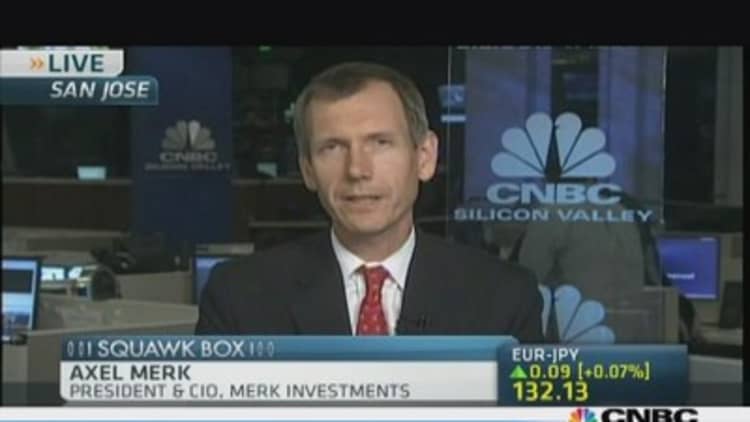The Federal Reserve's expected move to scale back monetary stimulus signals that the U.S. economy is gaining traction, but some economists argue that the good growth story is precisely why things look bad for the dollar and bond markets.
"The biggest threat we are facing might be economic growth," Axel Merk, chief investment officer at Merk Investments, told CNBC. "Every time we've had good economic indicators in the U.S. pop up, bonds have fallen pretty sharply."
(Read more: Here it comes: Are you ready for the Fed to taper?)
And if growth kicks into high gear, governments will need to pay higher interest on their debt, which would be negative for dollar and debt, he added.
"Bonds are going to fall off the cliff because government deficits are going to be very difficult to sustain," he noted. While central banks such as the Fed and the Bank of Japan may step in to put a lid on yields, currencies will suffer, he added.

According to Peter Schiff, CEO of Euro Pacific Capital, the recovery that the U.S. economy is experiencing "is built entirely on the foundation of housing and stock-related wealth," and aggressive tapering will bring the end to "phony wealth" and the U.S. economy "back in recession."
"[The Fed is] afraid that just the beginning of the taper might be the beginning of the end, because the bond market might get killed, which means interest rates rise for the government, mortgage rates rise for the homebuyers, and that's it for the recovery," Schiff said in an interview on CNBC.
(Read more: Fed taper likely to be announced this week: El-Erian)
Merk notes that the U.S. dollar's delicate situation is exacerbated by the fact that its status as a reserve currency is slowly being eroded.
"When crises have flared up in recent times, the has benefited more," Merk said. He believes neither bonds nor equities offer decent investments and is shifting toward cash and out of the dollar.
But, some analysts believe the outlook of the dollar is sound, even though its strength may be undermined by capital outflows in the near term.
(Read more: Why tapering doesn't mean QE is going away)
"Eventually we expect higher U.S. yields to attract foreign flows, especially from Japan as lifers etc., boost their holdings of U.S. Treasurys," said Mitul Kotecha, global head of foreign-exchange strategy at Credit Agricole, in a note.
He expects the U.S. dollar to resume appreciating in the fourth quarter and next year.
—By CNBC.Com's Leslie Shaffer; Follow her on Twitter @LeslieShaffer1

